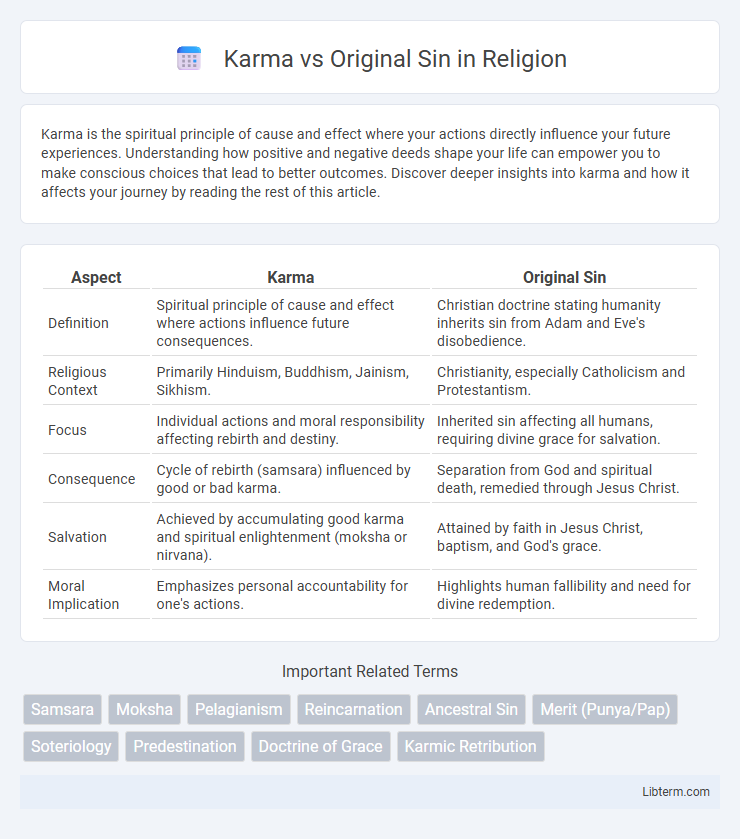Karma is the spiritual principle of cause and effect where your actions directly influence your future experiences. Understanding how positive and negative deeds shape your life can empower you to make conscious choices that lead to better outcomes. Discover deeper insights into karma and how it affects your journey by reading the rest of this article.
Table of Comparison
| Aspect | Karma | Original Sin |
|---|---|---|
| Definition | Spiritual principle of cause and effect where actions influence future consequences. | Christian doctrine stating humanity inherits sin from Adam and Eve's disobedience. |
| Religious Context | Primarily Hinduism, Buddhism, Jainism, Sikhism. | Christianity, especially Catholicism and Protestantism. |
| Focus | Individual actions and moral responsibility affecting rebirth and destiny. | Inherited sin affecting all humans, requiring divine grace for salvation. |
| Consequence | Cycle of rebirth (samsara) influenced by good or bad karma. | Separation from God and spiritual death, remedied through Jesus Christ. |
| Salvation | Achieved by accumulating good karma and spiritual enlightenment (moksha or nirvana). | Attained by faith in Jesus Christ, baptism, and God's grace. |
| Moral Implication | Emphasizes personal accountability for one's actions. | Highlights human fallibility and need for divine redemption. |
Understanding Karma: Origins and Concepts
Karma, rooted in ancient Indian religions such as Hinduism, Buddhism, and Jainism, refers to the spiritual principle of cause and effect where a person's actions directly influence their future experiences. The concept emphasizes personal responsibility and ethical living, with positive deeds generating good karma and negative actions producing bad karma, shaping the cycle of rebirth and spiritual progress. Unlike original sin, which posits an inherited sinful state from Adam and Eve, karma is individual and accumulative, grounded in one's own moral behavior rather than ancestral transgressions.
The Doctrine of Original Sin: A Christian Perspective
The doctrine of Original Sin in Christian theology posits that humanity inherits a fallen state and a propensity to sin from Adam and Eve's first disobedience in the Garden of Eden, impacting all descendants. This inherited sinfulness necessitates divine grace for salvation, emphasizing humanity's reliance on Christ's redemptive sacrifice. Unlike karma, which involves moral causality and reincarnation, Original Sin centers on inherited guilt and the need for spiritual redemption through faith.
Core Philosophical Differences
Karma in Hinduism and Buddhism emphasizes moral causation and personal responsibility, where every action directly influences future experiences through a cycle of rebirth. Original Sin in Christianity centers on the inherited state of sinfulness from Adam and Eve, affecting all humanity and necessitating divine grace for redemption. The core philosophical difference lies in Karma's impersonal, self-governing ethical system versus Original Sin's emphasis on inherited guilt and the need for salvation through faith.
Role of Personal Responsibility in Karma and Original Sin
Karma emphasizes personal responsibility by linking individual actions directly to consequences, empowering people to shape their future through ethical behavior and intentions. Original sin, rooted in Christian theology, attributes inherited guilt to all humans due to Adam and Eve's transgression, highlighting the need for divine grace rather than personal merit for salvation. While Karma promotes self-accountability across lifetimes, Original sin underscores human dependency on redemption beyond personal efforts.
Impact on Moral Behavior and Ethics
Karma emphasizes the direct correlation between an individual's actions and their future consequences, fostering personal accountability and ethical behavior based on cause and effect. Original Sin, rooted in Christian theology, suggests an inherent moral corruption inherited from Adam and Eve, influencing human nature and the need for divine grace to achieve redemption. This belief shapes moral behavior by emphasizing obedience to divine commandments and reliance on spiritual salvation rather than self-determined ethical consequences.
Afterlife and Redemption in Each Belief
Karma in Hinduism and Buddhism dictates that actions influence future rebirths, with the afterlife shaped by accumulated deeds and the possibility of eventual liberation (moksha or nirvana) through self-realization and ethical conduct. Original Sin in Christianity asserts that humanity inherits a sinful nature from Adam and Eve, necessitating divine grace and Christ's sacrifice for redemption and entry into eternal life with God. While Karma emphasizes moral causality and self-driven purification across lifetimes, Original Sin centers on hereditary sinfulness and salvation granted through faith and repentance.
Societal Influence: Eastern vs. Western Outlooks
Karma shapes societal behavior in Eastern cultures by emphasizing moral causality, where actions directly influence future experiences, fostering community harmony and personal responsibility. Original Sin in Western thought underscores inherent human imperfection, framing societal norms around redemption through divine grace and institutional religion. These differing views impact social structures: Eastern societies often promote collective ethical development, while Western societies emphasize individual salvation and legalistic moral codes.
Transgenerational Effects: Inheritance of Sin and Karma
Karma and original sin both address transgenerational effects, yet Karma emphasizes personal actions influencing one's future lives, while original sin suggests an inherited moral flaw passed from Adam and Eve to all descendants. Karma operates through cause and effect, where individual deeds accumulate and shape subsequent existences, reflecting a dynamic ethical responsibility. Original sin implies a static, inherited condition requiring divine grace for redemption, highlighting theological differences in how transgenerational moral states are understood and addressed.
Reconciliation and Forgiveness: Paths to Purification
Karma and Original Sin both highlight the importance of reconciliation and forgiveness as essential paths to spiritual purification and liberation from moral burdens. In karma, purification occurs through intentional actions, self-awareness, and repentance, promoting growth and balance in the soul's journey. In contrast, Original Sin emphasizes divine forgiveness through grace and sacramental confession, restoring the soul's sanctity and reconciling humanity with God.
Contemporary Interpretations and Debates
Contemporary interpretations of Karma emphasize personal accountability and the cyclical nature of actions influencing future experiences, contrasting with Original Sin's focus on inherent human fallibility rooted in biblical doctrine. Debates center on Karma's operational ethics within Eastern religions versus Original Sin's theological implications for salvation in Christianity. Scholars analyze how both concepts shape moral frameworks and human behavior, reflecting diverse cultural understandings of justice and redemption.
Karma Infographic

 libterm.com
libterm.com